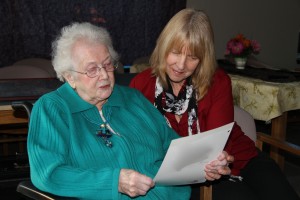New Research
Due to a combination of pervasive stereotyping (1), cognitive impairment and complex health conditions (2), those living in residential long-term care face numerous challenges to finding meaning and purpose, establishing and maintaining relationships, and coping with change.
Now, new research is demonstrating that persons with dementia are capable of leading small group activities for other persons with dementia (3). They were able elicit high levels of positive engagement and affect in their fellow residents with dementia. Not only that but the results were obtained across a wide range of dementia levels. The implications of this research are significant. Residents helping residents. Not only does this provide a new meaningful collective social identity for residents with dementia, but it also flies in the face of the ‘ageism’ that persists against seniors.
Helping others, also referred to in the literature as ‘productive activity’ (unpaid helping or contributing to others), has a positive effect on resilience, health and well-being (4-6), and loneliness and depression in particular (7).
There is a growing interest in the field of gerontology in promoting productive activity as an antidote to the stereotypical frail older adult (8). In the study conducted by Skrajner (2014), resident group leaders were able to elicit high levels of positive engagement of their fellow residents with dementia.
Contributing or volunteering has potential to strengthen a sense of shared social identity. Within the current constrained resources and high resident to staff ratios, residents themselves represent a largely untapped resource in our attempts to deliver psychosocial care.
The biggest challenge residents face in their struggle for social identity however, may stem from this deeper issue—the pervasive stereotyping within the larger culture of senior living. Residents across senior living (and particularly those living with dementia), are typically cast as passive recipients of care (8). It reminds us that combating stereotyping and ageism is an important responsibility that is shared by all of society.
We need to remove from our language and actions the notion that residents are necessarily incapable. Our role is to put the right supports in place, so that residents can contribute to all aspects of life in their communities—and create reciprocal relationships, and a rich quality of life for themselves that they deserve.
Submitted by Kristine Theurer, MA (Gerontology), MTA
References
(1) S., & Winsby, M. (2011). A relational perspective on autonomy for older adults residing in nursing homes. [Comment]. Health Expectations, 14(2), 182-190. doi: http://dx.doi.org/10.1111/j.1369-7625.2010.00638.x
(2) Alzheimer Disease International. (2013). World Alzheimer Report 2013. Journey of Caring: An Analysis of Long-Term Care for Dementia. London: Alzheimer Disease International.
(3) Skrajner, M. J., Haberman, J. L., Camp, C. J., Tusick, M., Frentiu, C., & Gorzelle, G. (2014). Effects of using nursing home residents to serve as group activity leaders: Lessons from the RAP project. Dementia, 13(2), 274-285. doi: 10.1177/1471301213499219
(4) Jetten, J., Haslam, C., & Haslam, S. A. (2012). The social cure: Identity, health and well-being. New York, NY: Psychology Press.
(5) Jung, Y., Gruenewald, T. L., Seeman, T. E., & Sarkisian, C. A. (2010). Productive activities and development of frailty in older adults. The Journals of Gerontology, Series B: Psychological Sciences and Social Sciences, 65B(2), 256-261. doi: 10.1093/geronb/gbp105
(6) Schwartz, C. E. (2007). Altruism and subjective well-being: Conceptual model and empirical support. In S. G. Post (Ed.), Altruism and Health (pp. 70-81). New York, NY: Oxford University Press.
(7) Cruwys, T., Haslam, S. A., Dingle, G. A., Jetten, J., Hornsey, M. J., Chong, E. M. D., & P.S.Oei, T. (2014). Feeling connected again: Interventions that increase social identification reduce depression symptoms in community and clinical settings. Journal of Affective Disorders, In press, 139-146. doi: 10.1016/j.jad.2014.02.019
(8) Bartlett, R., & O’Connor, D. (2010). Broadening the dementia debate: Towards social citizenship. Portland: The Policy Press.

